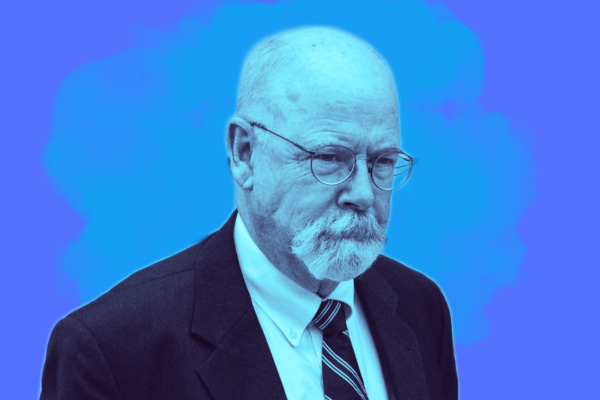The Durham Report and Those it Implicates
The FBI, Democratic politicians, and the media take some lumps.
Four years ago, Robert Mueller's special counsel team reported that they had found no election collusion between then President Trump and the Russian government. It was good news for our country, but the conclusion didn’t sit well with many on the left. Democratic politicians and liberal-media figures had convinced them over several months that collusion was not only likely, but an absolute certainty.
I wrote this at the time:
In the aftermath, the anti-Trump crowd is calling for the full release of the Mueller report, while the pro-Trump crowd is calling for the full release of documents detailing the grounds for the collusion component of the Russia investigation (including FISA applications, testimony in secret hearings, Rod Rosenstein's scope memorandum, etc.).
Good. All of this should be done (except in cases of legitimate national security concerns). Just as the president isn't above the law, neither are those who were involved in the investigation process. Let's look at everything we can.
It was looked into. In April of 2019, then Attorney General William Barr tasked attorney John Durham with investigating the origins of the collusion allegations and investigative work surrounding them. Durham’s job was basically to determine if there was criminal, prosecutable activity involved in the collection of intelligence. Barr would later give Durham special counsel status of his own, so that his work would continue if Trump lost his re-election bid (which he did).
Durham and his team weren’t the only ones digging. In late 2019, Inspector General Michael Horowitz produced his own report on the matter. It shot down a number of conspiratorial narratives coming from the right, but the findings, as I described at the time, by no means reflected well on the FBI:
Horowitz identified several instances of errors and glaringly poor judgment within the organization. This included a number of FISA applications related to Carter Page that were lacking important information that would have otherwise challenged the legal bar for probable cause. In fact, the warrant request on Page was based heavily on the very sketchy Steele dossier. And with each warrant renewal, the process worsened with the FBI making at least 10 “significant errors.”
One FBI lawyer even adjusted a legal document to mislead the court, and there was an ethical breach involving Bruce Ohr, a DoJ attorney who was in communications with Christopher Steele after the FBI severed its relationship with him; Ohr’s wife was an independent contractor working with Fusion GPS (where the Steele dossier mostly came from).
What makes such dereliction particularly troubling is that everyone involved at the FBI assuredly knew how sensitive any investigation (even indirectly) involving a political campaign should have been handled. If this kind of negligence exists in the FISA process for figures connected to a presidential nominee (for which there would likely to be a review), just imagine what kind of negligence may exist in cases of lower visibility.
Indeed.
Earlier this week, Durham released his long-awaited report. He reached similar conclusions as Horowitz, and described the opening of the collusion probe as being based on “raw, unanalyzed, and uncorroborated intelligence.” Durham determined that the FBI gave far too much credibility to supposed evidence provided by Trump’s political opponents (including Hillary Clinton’s campaign). He stated that if the bureau had applied the “standard analytical tools typically employed by the FBI in evaluating raw intelligence,” that evidence would not have warranted an investigation.
What Durham notably didn’t find in his review was criminality. There was surely political bias, and numerous examples of institutional wrongdoing (some of which the FBI acknowledges), but no laws were broken.
Now, if I were to apply the same standard to the FBI that countless readers insisted, for years, that I should have applied to Donald Trump when he was president, the mere legality of the misconduct would serve as total vindication of the agency. But I didn’t play that game then, and I’m not going to start now. Individuals within the FBI absolutely abused their power, and they should be called out and reprimanded for it, if they haven’t already.
And while we’re at it, political leaders and members of the media who, for years, presented collusion between Trump and Russia as a fact rather than a theory, should also be called out — including Adam Schiff, Jonathan Chait, Rachel Maddow, and Andrew McCabe. These irresponsible, and in some cases downright dishonest people did the American public a tremendous disservice.
Trump, of course, has never done himself any favors with his incessant, sometimes perverse fawning over Vladimir Putin. And in 2016, very poor choices — like calling on Russia to hack Hillary Clinton’s emails, while his campaign hired people like Paul Manafort, and was willing to meet with a Kremlin-linked lawyer promising anti-Clinton information — only added to suspicions of some kind of partnership between the two; the same goes for Trump’s explanation for firing James Comey, which led to the Special Counsel.
But suspicions aren’t reality.
The Russian government, for its part, absolutely tried to get Trump elected, but there was never anything beyond circumstantial evidence indicating a collaborative effort with Trump. Individuals at the FBI may have been inclined to believe otherwise, and numerous Democrats and media-figures definitely were… along with millions of news consumers who listened to them.
But sadly, while the FBI says it has taken steps to prevent such misconduct in the future, there’s no reason to believe that the politicians and members of the media who got this story totally wrong will be met with any kind of accountability beyond some online mockery.
Today’s dirt-low political and media standards simply allow for business as usual.




Then online mockery IT WILL BE!
His Utmost Excellency, The Emperor, Has Spoken!